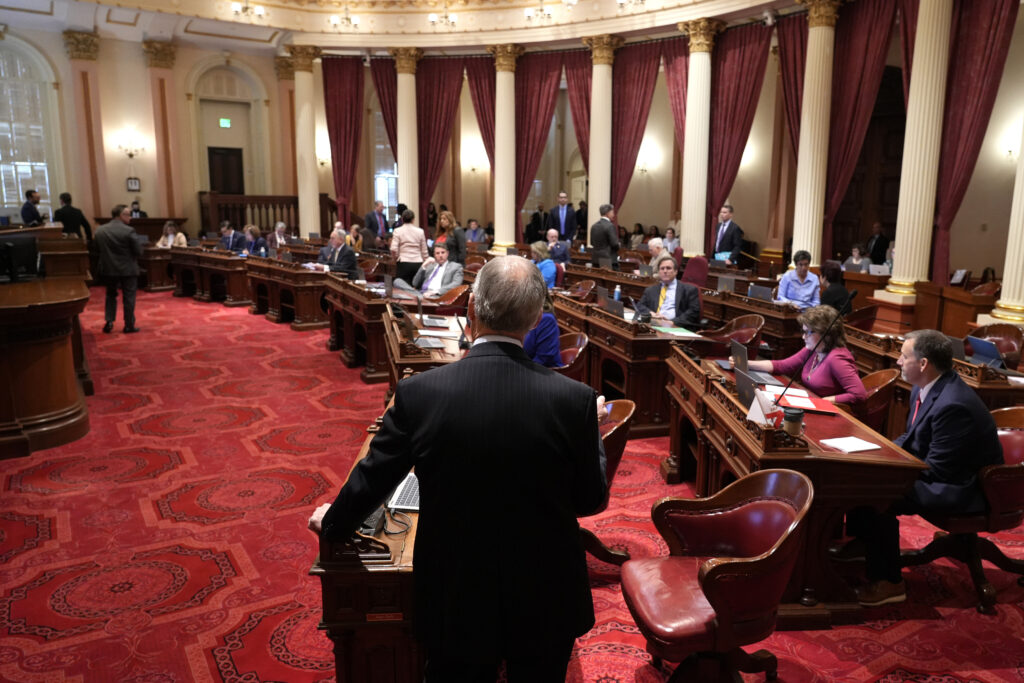
State Sen. Roger Niello, R-Fair Oaks, vice chairman of the Senate Budget and Fiscal Review Committee, back to camera, urges lawmakers to reject a measure to reduce the state budget deficit at the Capitol in Sacramento on April 11, 2024.
Credit: AP Photo/Rich Pedroncelli
California lawmakers on Thursday passed a budget for 2024-25 that incorporates the framework of a deal the governor negotiated last month with teachers union officials over how to deal with part of the state’s big revenue problem.
Many details of the spending plan will be hashed out in the coming days and weeks, but Thursday’s action will allow lawmakers to continue getting paid because it meets the constitutional requirement that they pass a budget before June 15.
The bare-bones plan passed Thursday would increase the size of the can lawmakers had previously contemplated kicking down the road in order to deal with lagging revenue. It would increase the amount of Proposition 98 funding — the amount of the overall general fund that must go to K-12 education and community colleges — that would be suspended in the current year, but with the expectation that much of it will be repaid and revenue will increase in the coming year.
Plenty of details remain unresolved. The Senate and the Assembly rejected $895 million that Gov. Gavin Newsom had proposed in one-time funding to purchase zero-emission school buses, and instead reinstated a cut that Newsom had proposed for the Golden State Teachers Grant Program, which pays $20,000 to teacher candidates who agree to teach in priority schools for four years. A supplemental bill that has not been released will detail how the rest of the money would be used. The Legislature accepted Newsom’s proposed cut of $550 million in facilities for transitional kindergarten and full-day kindergarten on the assumption that money will be included in a facilities bond that the governor and legislative leaders are negotiating to place on the November election ballot.
The framework with the California Teachers Association last month settled the question of how the state would account for an $8.8 billion shortfall in revenue below what the Legislature appropriated for 2022-23. The deal calls for suspending funding still owed for the current year ending June 30 — something that had been done only twice in the past 40 years — by $5.5 billion and delaying paying $2.6 billion appropriated for 2023-24 until 2024-25.
Suspending a portion of the Proposition 98 obligation requires creating a type of IOU that must be repaid in coming years. Newsom avoided outright cutting of TK-12 and community college funding by suspending some state funding and pushing off paying districts from the end of one fiscal year to the start of the next one — a tactic known as deferrals.
The placeholder budget passed on Thursday increases the funding that will be suspended by $2.8 billion. The Legislature assumes that higher income tax revenue next year, based on updated projections that Newsom didn’t have for his revised May budget, will help to pay down the suspended funding. The Legislature also would generate a new source of revenue by accelerating a three-year postponement of deductions that corporations can claim from net operating losses and various business tax credits. That would bring in temporarily $5 billion, of which about $2 billion would go to schools and community colleges under Proposition 98.
Newsom had proposed the three-year interruption to begin in 2025-26. Since businesses haven’t had time to plan an accelerated schedule, Newsom hasn’t said if he’d go along. Resuming the operating deductions and credits would then reduce revenues in future years.
Republicans in the Legislature criticized addressing the state’s budget deficit by raising taxes on the business community and shifting funds around. The budget is “little more than a shell game meant to hide the bleak truth of our financial situation,” said Senate Minority Leader Brian W. Jones, R-San Diego, who blamed overspending for the swing from a massive budget surplus to a deficit in two years.
The advocacy group Children Now, generally an ally of the Democratic leaders on children’s issues, criticized increasing the amount of Proposition 98 suspension and the use of funding deferrals. Suspension, the group said, “should be a last resort, not a tool to manipulate education spending,” adding that suspension, with its creation of an IOU, subjects education to funding volatility and uncertainty about when the money will be repaid.
“While we understand the necessity of suspending Proposition 98 under the current circumstances, a suspension isn’t ideal, and its size should be minimized as California still ranks fifth worst in the nation in terms of student-to-teacher ratios and, similarly, has among the lowest staffing levels for other educators, including support staff, nurses, and administrators,” the letter said.
Senate President pro Tempore Mike McGuire, D-Geyserville, predicted a deal between lawmakers and Newsom as early as next week and that the final budget would be similar to what the Legislature approved.

